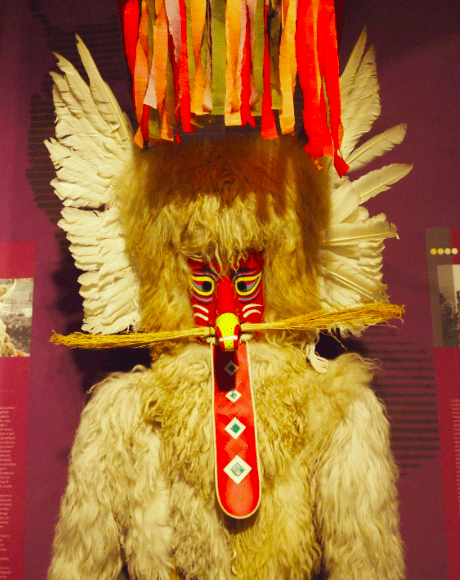Made in Slovenia
STA, 28 November - Dry stone walling, the ancient building method used in Slovenia, Cyprus, Greece, Bulgaria, Croatia, Italy, Switzerland, France and Spain, has been included on the UNESCO list of intangible cultural heritage of humanity.
The decision was taken in Port Luis, Mauritius, on Wednesday at a session of the UNESCO Intergovernmental Committee for the Safeguarding of the Intangible Cultural Heritage, the Slovenian Culture Ministry said in a press release.
The bid had been submitted by Cyprus together with the other eight countries in March 2017.
In Slovenia, dry stone building by stacking stones found in the soil when cleaning farmland without the use of adhesive materials was typical particularly in the Kras and Istra regions in the south-west.
Related: Explore Slovenia’s cultural heritage through 17 of its historic towns
Such walls were built to fence gardens, meadows, vineyards, graveyards or to separate land or roads. Often dry stone walls protected people's assets from wind and fire.
The skill was passed on from generation to generation until WWII. But then traditional farming was increasingly abandoned, so this building method fell into disuse and is now known only to generations born before the war.
Slovenia, Cyprus, Greece, Bulgaria, Croatia, Italy, Switzerland, France and Spain presented the most wide-spread traditional techniques of this type of building in their UNESCO bid and highlighted its common cultural meaning and functions in all of the countries involved.
The elements of the UNESCO list of intangible cultural heritage of humanity, the list of intangible cultural heritage in need of urgent safeguarding and the registry of best practices are deemed as significant bastions of humanity's intangible heritage, the highest honour for intangible heritage in the world stage.
Other aspects of Slovenia’s cultural heritage are already on the list
The lists were established in 2008 when the 2003 Convention for the Safeguarding of the Intangible Cultural Heritage took effect. Slovenia ratified it in 2008 and set up the national registry of intangible cultural heritage the same year.
Other Slovenian entries on the UNESCO list of intangible cultural heritage are the door-to-door rounds of Kurenti, a traditional Slovenian carnival costume, (since December 2017) and the Škofja Loka Passion, the mass staging of an early 18th-century play, which made it to the list in December 2016.
Another Slovenian bid is expected to be endorsed on Thursday after the country officially nominated in March this year bobbin lace making, a traditional lace-making technique using special wooden sticks - bobbins. The tradition is especially strong in the northwestern areas around Idrija, Cerkno and Škofja Loka.
A kurent costume in Ljubljana's Ethnographic Museum. Photo: JL Flanner
STA, 25 November 2018 - A comic book about the life of author Ivan Cankar (1876-1918) has won the Book of the Year Grand Prix at the 34rd Slovenian Book Fair, which will conclude later today.
The biographic novel entitled Ivan Cankar: Podobe iz Življenja (Ivan Cankar: Images from Life) by Blaž Vurnik and Zoran Smiljanić marked the centenary of Cankar's death, observed this year.
"The precise, chronologically linear Vurnik's screenplay is supported by fragments from Cankar's works, letters and documents from his time. Skilfully zoomed in black-and-white images in Smiljanić's recognisable film language are dynamically intertwined with the self-conscious design and typographic attentiveness of Katja Kastelic," the jury said.
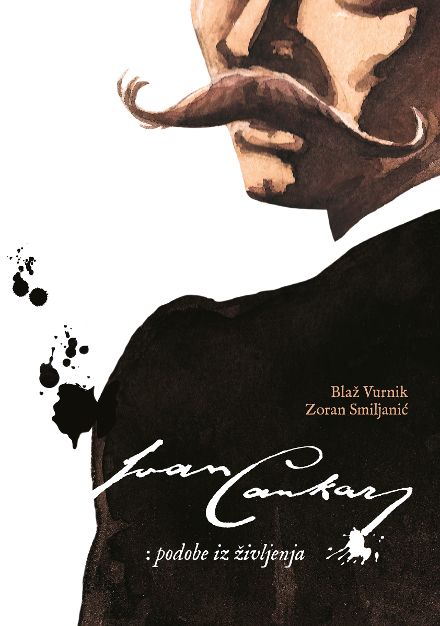
The cover of the winning book, available in stores and online from Stripburger
The comic book translates an intense life story, full of twists and turns and fatal decisions, into a "superb reading experience", according to the jury.
The authors of the comprehensive publishing project have created a work that will be also topical beyond 2018, Cankar's year. "They have created a character of the biggest Slovenian writer that we have not known before", the jury said.
A hundred years after his death, Cankar has become an immortal comic book hero thanks to the book issued by the Ljubljana Museums and Galleries and Forum Ljubljana as a special issue of Stripburger, a comics magazine, it added.
The five-member jury assessed books that were issued between 1 October 2017 and 1 October 2018 based on their contents, editing, language, design, illustrations, photographs and graphics.
Four other books were shortlisted for the prize
Next to the winning book, four other books were shortlisted for the prize: Žiga Valetič's review of the Slovenian pop-rock in the 1980s, Novi Maribor (New Maribor) by Primož Premrzl, Anja Štefan with her collection of poems for children whose title translates as Crumbs from Mouse Valley, which already earned her this year's Večernica prize, and a book about Aleš Debeljak's postcards by Erica Johnson Debeljak and Nela Malečkar.
Last year, the Book of the Year Grand Prix went to Vrata Nepovrata (The Door of No Return), an epic poem which took Boris A. Novak 20 years to write.
The Slovenian Book Fair, the biggest publishing event in the country, started on Tuesday evening featuring 106 exhibitors and more than 300 events. The organisers estimated the number of visitors at some 30,000.
The fair, which paid homage to Cankar this year, will close this evening with a debate featuring Croatian author Slobodan Šnajder and playwright Dušan Jovanović.
STA, 23 November 2018 - One hundred years after General Rudolf Maister established the first Slovenian army in modern history, Alenka Ermenc was promoted to become the country's first woman army general.
Slovenia celebrates Rudolf Maister Day on Friday in memory of the day in 1918 when the general (1874-1934) took control of Maribor and in effect secured what later became Slovenia's northern border.
The ceremony at which President Borut Pahor formally elevated Brigadier Ermenc to major general and decorated the association dedicated to the preservation of memory of General Maister was only one in several events marking the anniversary.
Pahor noted that a century ago Maister, "with his bravery and patriotic heart, preserved Maribor and the Lower Styria as Slovenian".
"One hundred years later, Slovenia is one of the world's safest countries. It is the merit not only of our defence force, but of society and country as a whole."
Pahor noted that Slovenia had to defend its independence with an armed force in 1991 and that Ermenc, who was made the first woman general today, was a member of the emerging Slovenian army then.
"This is a momentous moment for her, for the Slovenian Armed Forces, for our national and civic confidence, for our homeland and country," he said.
Putting on her new uniform of major general and accepting the Slovenian flag from the president, Ermenc said it was "the love for homeland" that guided her on her path, which was not always easy.
"I'm aware that the army is victorious only through joint effort and that the average never win," she said, underscoring the importance of knowledge and hard work.
Major General Ermenc studied in London, was in the independence war
Ermenc graduated from the Ljubljana Faculty of Social Sciences and from the Royal College of Defence Studies in London and got her master's degree in 2009 at the King's College University of London.
She was actively involved in the 1991 independence war as a member of the Territorial Defence, the army's precursor. She has been employed in the SAF for 27 years.
She was promoted to the rank of brigadier in May 2011 and in March this year she was named deputy chief of the general staff, the highest rank for a woman in the army.
Roughly one out of six members of the active component of Slovenia's Armed Forces are women (1,097 out of 6,658), including 188 civilians. As many as 301 are officers or non-commissioned officers.
Pahor also presented an Order of Merit to the General Maister Association and its founder Milan Lovrenčič for their efforts in the preservation of memory of the general and his contribution to Slovenia.
It was thanks to the association that 23 November has been observed as a public holiday since 2005, although not as a bank holiday. At the association's initiative the Maister Library of the University of Maribor, which keeps his books, has recently been declared a monument of national importance.
Ob dnevu Rudolfa Maistra je PRS in vrhovni poveljnik obrambnih sil priredil posebno slovesnost ob povišanju Alenke Ermenc v čin generalmajorke in vročil državno odlikovanje Zvezi društev general Maister in mag. Lovrenčiču. https://t.co/a4eYNg1n6I pic.twitter.com/dDE952kbRF
— Borut Pahor (@BorutPahor) November 23, 2018
Why Maister is the biggest name in Slovenian military history
Judging by his popularity, Maister is likely the most prominent military personality in Slovenian history. It is largely owing to him that Maribor, Slovenia's second city, and the north-east of Slovenia became part of the new Yugoslav state rather than Austria after the Austro-Hungarian Empire collapsed.
Maister was in command of the regional headquarters at the end of World War I and in 1918 assumed command of Maribor and the Slovenian part of Carinthia. He set up a Slovenian army of 4,000 soldiers, disarmed the German Schutzwehr security service, and disbanded the militia of the German city council.
The general then occupied Slovenian ethnic territory, establishing the northern border between Austria and Yugoslavia that was later ratified by the Saint Germain Peace Treaty. The same border still runs between Slovenia and Austria today.
The main ceremony marking the holiday was held in Maribor last night. In his keynote, Speaker Dejan Židan described Maister, a general and a poet, as a resolute, confident, courageous, selfless and honest patriot with the soul of an artist. He said people of his calibre were needed today.
"At the time it was about life and death. The situation called for quick decisions and actions, not just on Maister's part but on the part of everyone involved ... It wasn't until after Slovenia's independence that his historic merit was acknowledged by official politics." Židan said.
The ceremony was also attended by President Pahor and members of the government, including Prime Minister Marjan Šarec, who praised Maister as the epitome of bravery, determination and resolve.
An exhibition showcasing Maister as general and poet was launched at the National Assembly today. While wreaths will be laid at his grave in Maribor, Slovenian air force aircraft will fly over the city.
In keeping with a tradition launched by him, Pahor is holding an open door at the Presidential Palace today.
Predsednik Pahor je na predvečer dneva Rudolfa Maistra položil venec k spomeniku Rudolfa Maistra na trgu generala Maistra v Mariboru. pic.twitter.com/ZABRh0dlom
— Borut Pahor (@BorutPahor) November 22, 2018
Related: All our stories on Slovenian history are here
STA, 21 November 2018 - A Slovenian project promoting intercultural connections, integration and education of women from the Western Balkans has won the international Alpine Pluralism Award 2018. The award was conferred in Innsbruck on Tuesday to the head of the humanitarian association UP Jesenice that runs the project, Faila Pašić Bišić.
The award-winning project is entitled Hands Revealed (Razkrite roke), which is a reference to the women who conceal their faces and communicate with the world through their loving and hard-working hands.
Currently, 30 women with a migrant background participate in the project, making unique textile products, which are available for sale.
The project is run by UP Jesenice for the fourth year in cooperation with the Ljubljana-based institute for modern textile art and design OLOOP.
This year, the project has been upgraded with a web site (here), where the hand-made products combining the traditional with modern as well as the women who create them are presented.
REVEALED HANDS from Žin on Vimeo.
"We are trying to complement social cohesion with art, not just folklore and cuisine," Pašić Bišić said about the project of including women from the Western Balkans in the labour market.
By taking part in the project, the women overcome many obstacles. "With Albanian women, we first had to talk to their husbands, because these cultures are extremely patriarchal and women are pushed in a passive role," Pašić Bišić said.
But while talking to the men, Pašić Bišić was shocked to learn that they too are socially very excluded despite having a job and speaking Slovenian, which are two crucial factors for integration.
"They do not know how the local community functions, they are not active in any sports associations and they do not know their environment," she said.
These are also the problems that their project is trying to overcome.
The Alpine Pluralism Award is conferred by non-profit organisation Cipra Lab and a task force operating as part of the EU strategy for the Alpine macroregion.
The Hands Revealed project is funded by the state and the EU social fund.
STA, 14 November 2018 - Slovenian researchers have made a tandem solar cell which transforms solar energy into electricity in the most efficient manner so far, which they see as an important step towards photovoltaics becoming more competitive in power production.
The new solar cell was developed by Marko Jošt from the Ljubljana Faculty of Electrical Engineering while on post-doctoral studies in Germany as part of a Slovenian-German project.
Jošt and several other researchers, among them fellow researchers from Ljubljana, published their findings in the prestigious journal Energy and Environmental Science.
Researchers from top-tier institutions around the globe have been competing since 2015 to develop the most efficient monolithic tandem solar cell.
Last month, Jošt, together with researchers from Germany's Helmholtz Centre and Slovenia's Ljubljana University, managed to set a new record by achieving 25.5% conversion efficiency.
The solar cell was improved with the use of a textured foil, which was produced in the lab for photovoltaics at the Slovenian faculty.
Although tandem cells are still in the R&D stage and there is a long way to go before their industrial use, lab boss Marko Topič says "such achievements prove that our goals are realistic".
The new tandem cell is according to the faculty a stone in the mosaic of knowledge and achievements which pave the way to photovoltaics being increasingly used for energy production.
Obstacles to a more wide use of solar energy are relatively low conversion efficiency of silicon solar cells, which are currently the standard in photovoltaics, and their relatively high price.
Jošt explained that silicon cells had reached their limit in conversion efficiency and low price, while the perskovite tandem cells have the potential for better conversion efficiency while increasing the price of a photovoltaic module just a bit.
Topič meanwhile believes that photovoltaics has already proved it could become "the key technology in the transformation of the energy system" and "as a low-carbon technology, the first solution to fight climate change".
Some weeks ago I was at one of the Pivo & Burger Fests in Ljubljana, researching Slovenia’s flourishing craft beer scene. Six months earlier I’d paused my investigations, overwhelmed by the number of breweries and beers that were turning up on my radar each month, anxious to reduce my drinking (and spending), and – to be frank – bored of IPAs.
Learn more about Slovenian craft beer here
It was thus with delight that I found a much evolved selection of beers at the festival, with a broader range on offer, including wheat beer, lager, porter, gose and, my new obsession, sour (and Bevog’s Lolita in particular). But beer wasn’t my only discovery that long and hazy weekend, as I also came across a stall offering samples of chili sauce – another market that’s seen a boom in Slovenian producers in recent years – and one these, the fiery but flavourful All Stars had an effect I can only describe as making me high.
A disclaimer on personal taste: I like hot food, with a preference for Indian, Sichuan and Thai, but I don’t like pure heat. Instead I crave a more rounded flavour, with bass notes to accompany the highs. I also have, like everyone else, a level of heat that tickles my brain in just the right way, just on the right side of pain to release the endorphins and have me putting down the fork, spoon or chopsticks and taking a little time out to enjoy the waves of pleasure and distress, before diving back in again and feeling the heat.
It was this level that Gorki’s All Stars hit, and I went back a couple of times to just try another dab on a breadstick, each time getting that same rush and happy high that left me smiling like a loon. I bought a bottle on the spot, and a gift pack of samples of their other sauces, and a bag of dark chili chocolates that, like the sauce, had a balance of flavours that went just far enough out of my comfort zone to flood me with joy, and that I finished the next morning with coffee.
I got talking to the two guys who run the company, Igor and Rok, learned that they produced everything in Koper, had won a big hot sauce competition in America, and were willing to give me an interview, as follows:
How did you start with chili farming?
We started four years ago, first as a hobby, simply because we love spicy food. We started with a few plants that we grew at home. Rok made a hot sauce out of the first chilies he grew and all our friends and family were enthusiastic about it. With their support we decided to grow more plants - a lot more – make more hot sauces and try to put them on the market. In the first place because the Slovenian market at that time didn't offer a lot of hot sauces or other chili products. And those few on the shelves weren't “the real thing”, in my opinion.
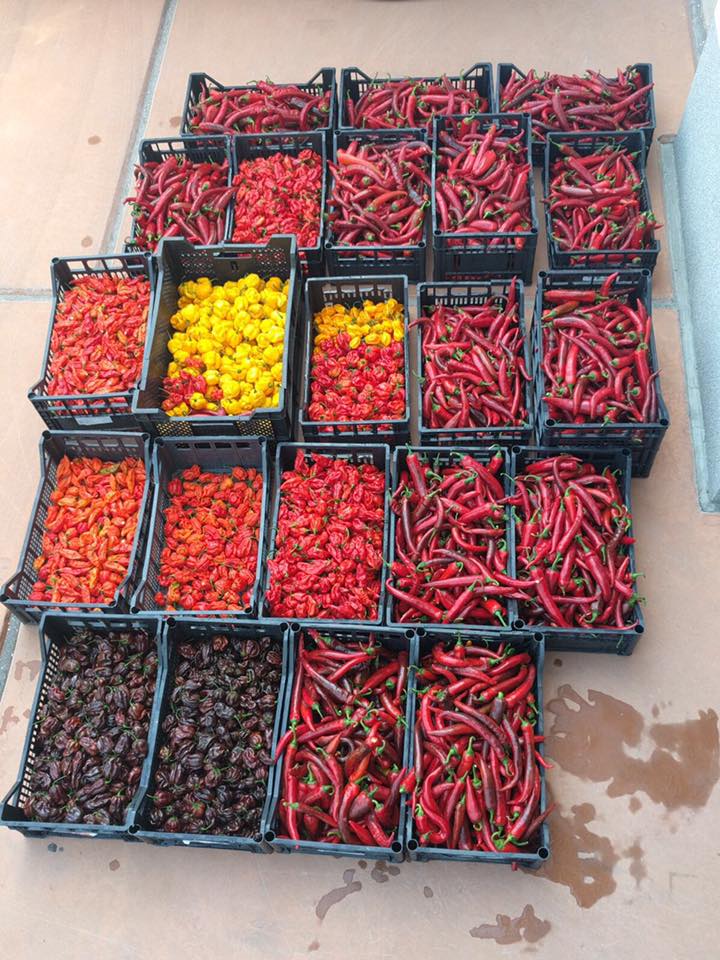
What problems did you face when starting your business, and how did you overcome them?
We were new to the business and there were really a lot of things to think about – taking care of the plants, cooking the sauces, creating our webstore, packaging, storage, creating a label … Somehow we managed to solve all those with good organizing and planning of the work.
Then in the fall 2014 we first created three hot sauces with different degrees of heat and started selling them through our webstore. By spring they were all gone, which was a really good start.
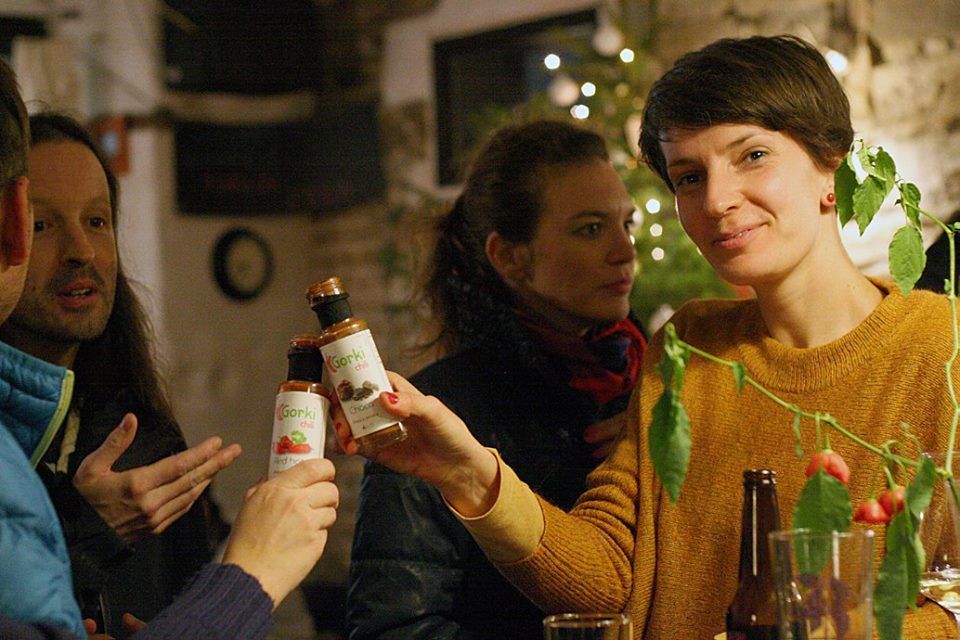
Two of your sauces came second and third at the 2017 World Hot Sauce Awards. Can you tell me a little about that.
We first entered the World Hot Sauce Awards competition in 2015. Back then our hot sauce Choco came third in the Latin style category. For us it was a clear sign that we were on the right track. A year after our hottest sauce, All Stars, came second and last year it was third. It’s an extra hot sauce, but besides that it tastes really good. We believe our products are special because we always put taste in the first place, rather than the heat. We choose the ingredients very carefully, we try to be creative when cooking and do as much testing as needed in order to achieve the right flavor. All this we believe is the key to quality.
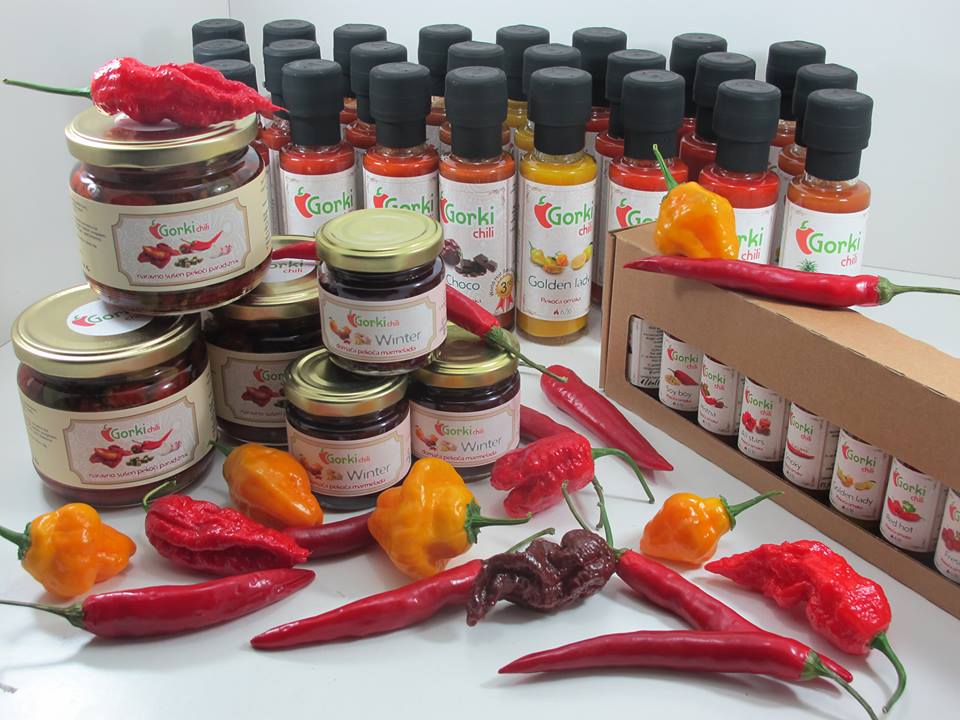
Which of your sauces do you enjoy the most?
It's very hard to answer this question. You know – it's like when a father is asked which child is his favourite. To us all of them are delicious, each in its own way, suitable for a different dish or for a different kind of chili lover, from beginners to real chiliheads.
That’s what keeps this exiting, not the one “best” sauce, but searching for new tastes, creating new products, meeting new people, having face to face contacts with our customers at fairs and festivals, where we can give them advice and have interesting debates about chilies.
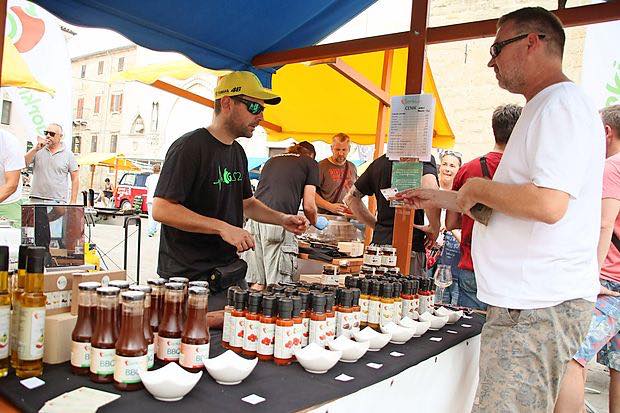
What are some of the other chili products you sell, beyond the sauces?
Hot paradajz is one of our bestsellers that also requires a lot of time to prepare, because it's all handmade. It consists of spicy dried tomatoes in extra virgin olive oil with garlic, capers and spices. Once you try it you can't live without it, really. We also make two types of BBQ sauce, hot marmalade, spicy chocolate, and spicy extra virgin olive oil which was named world champion at last year’s World Hot Sauce Awards.
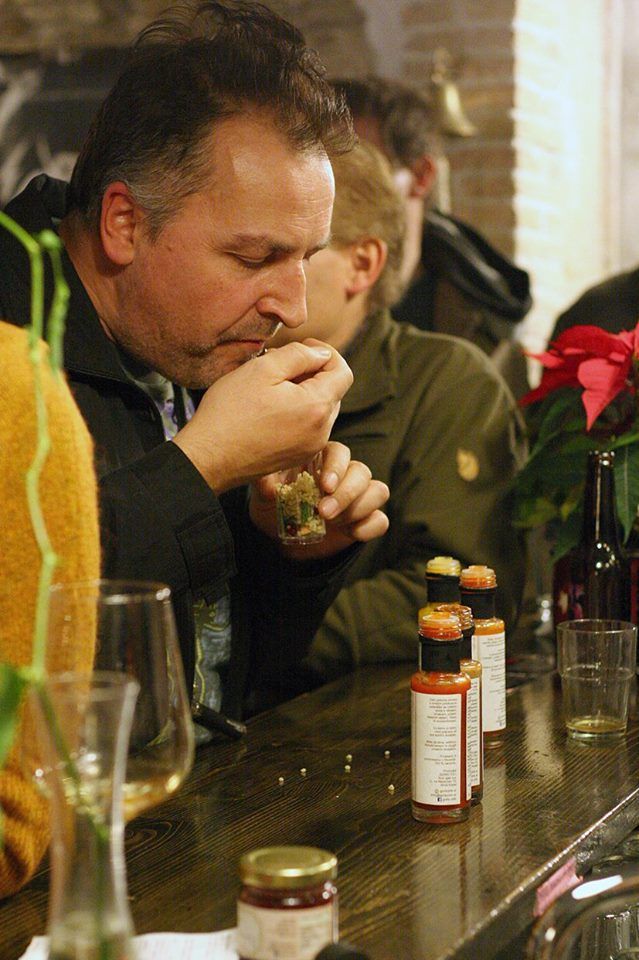
What are your plans now?
We plan to start selling our products on foreign markets, and of course keep on developing new ones. But for the moment everything is available in Spar and InterSpar all over Slovenia, in some small gourmet stores, and of course in our webstore. We also supply a lot of restaurants and pizza places with our sauces.
Anything else you’d like to say?
Yes, our philosophy in growing chilies and producing hot sauces has two main goals: quality and taste. Of course we want our hot sauces to be hot, but the flavour is always number one. We are happiest when our customers tell us that they enjoyed our products not because they taste like fire, but because they’re delicious.

You can find Gorki products in stores, at markets, and online, with the official website here (in Slovene, English and Italian), and note the neither TSN nor myself received any compensation for this article, just a few samples at that beer festival which were enough to turn me on to this story.
STA, 6 November 2018 - Researchers at the Jožef Stefan Institute have swept the field in a global machine learning competition aimed at leveraging the movement sensor capabilities of smart phones.
Participating in the Sussex-Huawei locomotion and transportation challenge, 11 researchers of the institute's Department for Intelligent Systems, separated into two teams, won first and second prize.
Using a combination of deep and classical machine learning models, the two teams were the only among 35 participating groups to exceed 90% accuracy with algorithms helping to identify whether the person carrying a smart phone is sitting still, walking, running, cycling or taking the bus, car, train or subway.
The winners were declared at the high-profile Ubicomp conference, which was organised in Singapore this year.
The achievement was also presented today by the heads of the two Slovenian teams; intelligence system department boss Matjaž Gams and the head of the institute's ambient intelligence group Mitja Luštrek.
"If the phone knows how we are moving, it can for instance provide useful advice related to transport, choose to reduce the number of notifications when we're driving, or switch the phone from ringing to vibrating mode when we're using the noisy metro," Luštrek illustrated.
The teams were using data collected over several months by researchers from the University of Sussex during their daily commutes.
While mentioning the possibility of marketing the solutions to companies developing mobile applications and phones, Luštrek explained that similar methods were already being used at the institute in several intelligent systems projects, including for applications in healthcare.
Related: In world first, Ljubljana hospital grows new nose on patient’s forearm (video)
Slovenia has produced a number of design classics, such as the K67 kiosk by Saša Janez Mächtig, Rex folding chair by Niko Kralj (1953), Marko Turk’s MD9 microphone (1963), and the Iskra ETA 80 telephone by Davorin Savnik (1978). To this list we may soon be able to add the Nico Less chair, an item that combines the admirable qualities of style, comfort and sustainability in a design that makes use of felt that’s mostly made from recycled plastic bottles.
STA, 15 October 2018 - A Slovenian architect who moved to Argentina in 1924 has left an important mark on the city that currently hosts the Summer Youth Olympic Games. Viktor Sulčič is one of the designers of the La Bombonera football stadium in Buenos Aires and he also came up with the nickname for the home of the popular Boca Juniors club.
STA, 15 October 2018 - An exhibition presenting the work of Elza Kastl Obereigner (1884-1973), a pioneer Slovenian sculptress, opened at the Ljubljana City Museum last Thursday. The exhibits were collected in the dusty attic of the artist's home with the permission of her granddaughter Angelika Hribar.
Andreja Podlogar and Blaž Bertoncelj are Argentinian tango world champions, internationally acclaimed artists, innovative teachers, researchers, critical thinkers and global tango ambassadors, whose visionary work is gathered in a small dance studio lab in the centre of Ljubljana, called Studio BA Tango. Andreja and Blaž shared with us their knowledge and views on the dance itself, its historic development, their diverse work and future plans, which include an ambitious project to create a global creative platform for critical thinking, applied knowledge and development of new creative potentials in the field, starting with an international tango symposium, which they plan to organise in 2019 in no other place but Ljubljana.


